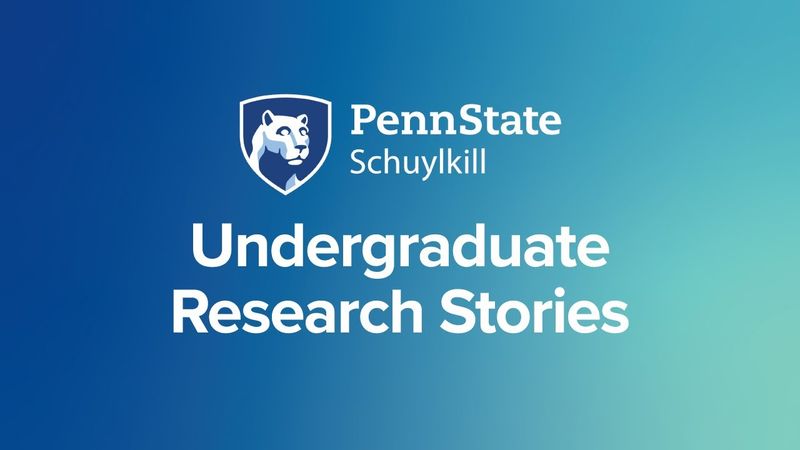Expand your mind, broaden your horizon
Among the many academic experiences offered at Penn State Schuylkill is the opportunity to collaborate with a Penn State faculty member on an original research project. Students are able to investigate important issues related to their academic interests by working one-on-one with a faculty member or as part of a supervised research team.
Penn State Schuylkill's undergraduate researchers participate in a wide array of research across various disciplines, from humanities to business to STEM and more. These research experiences often lead students to:
- present their work at regional and national conferences
- publish papers in peer-reviewed academic journals
- travel for data collection and/or research presentations
- gain hands-on experience that helps position students for graduate school admissions, including medical school, or career growth
These projects are sometimes part of a course for which students earn academic credits, or a student can serve as a wage assistant during the regular semester or summer.
Each semester, Penn State Schuylkill hosts events where students have the opportunity to present their original research to the campus community. Students may create research posters or deliver an oral presentation outlining their work, and these events often serve as test runs for students who go on to share their work at regional and national conferences.
Get involved
Students who are interested in becoming undergraduate researchers should contact Dr. Lee Silverberg, professor of chemistry and STEM Division coordinator, to get connected with a faculty research mentor.
Faculty Mentors on campus
Check out this listing of faculty mentors at Penn State Schuylkill. This list includes their discipline, how students can get involved in undergraduate research and current projects.
| Faculty Mentor | Discipline | Research Focus | Student Involvement |
| Dr. Marianne Adam | Nursing | Substance Use Disorder | Students can participate in qualitative data analysis and dissemination of data. |
| Dr. Nicole Andel | English and Humanities | Theatre and Drama of Medieval and Renaissance Britain | Students can complete an array of self-determined projects. Past projects include investigating Greek Orthodox iconography at local church, comparing Haggadahs used at Seders in contemporary Jewish-American celebrations and more. |
| Dr. Harold Aurand | History | Communities | Students can work with Dr. Aurand in independent study. |
| Cathy Fiorillo | Theatre and Communications | Speech Communication and Theatre | Fiorillo recruits students from her courses to work with her on films as actors or behind the scenes. |
| Dr. Michael Gallis | Physics | Pedagogy and Visualizations | Students can get involved with Dr. Gallis's research by taking his courses with the honors option. Students help brainstorm, code, and test simulations and animations, or testing of pilot versions of new lab activities. |
| Kelly Puzzi, M.D. | Biology | Anatomy and Physiology | Students can create an individualized and independent study related to health care. Puzzi works alongside students to develop a personalized plan to bridge the gap between textbook material and real-world concepts. |
| Dr. Jessica Saalfield | Psychology | Effect of Geography on Substance Use Disorder | Students can participate in independent study or do research on a volunteer basis. Students can write papers, analyze data from large scale projects and create their own study and collect their own data. |
| Dr. Valerie Schrader | Communication Arts and Sciences | Rhetorical Criticism of Text and Performance | Students can complete research with Dr. Schrader through the honors option in her courses, or as part of an independent study. She also works with students to prepare their work for the Eastern Communication Association's Undergraduate Scholars Conference (ECA-USC) each year. Students conduct rhetorical criticism or autoethnographic projects. |
| Dr. Lee Silverberg | Chemistry | Heterocylces | Students can participate in research as volunteers or as part of the honors option. Students work alongside Dr. Silverberg in the lab to do reactions, purification and analysis of organic compounds. |
| Mary Ann Smith | Environmental Microbiology and Chemical Ecology | Sustainability | Students can participate in research through the honors option for Smith's courses or can volunteer. Students perform isolations from natural materials, test components discovered against known bacteria, and characterize organisms discovered. |
OVPCC Undergraduate Student Research Fund
Penn State's Office of the Vice President for Commonwealth Campuses (OVPCC) is launching the brand-new OVPCC Undergraduate Student Research Fund. This initiative is a commitment to support and grow undergraduate student research opportunities at the Commonwealth Campuses.
Students are eligible for up to $2,500 towards project costs and living expenses, and are required to be enrolled in undergraduate courses at one of Penn State's Commonwealth Campuses, along with having a faculty research mentor. Projects should be the students own work, but they can be related to the supervising faculty member's research or scholarly interests. Students and faculty interested in the OVPCC Undergraduate Student Research Fund should contact Judith Bowman for information.

